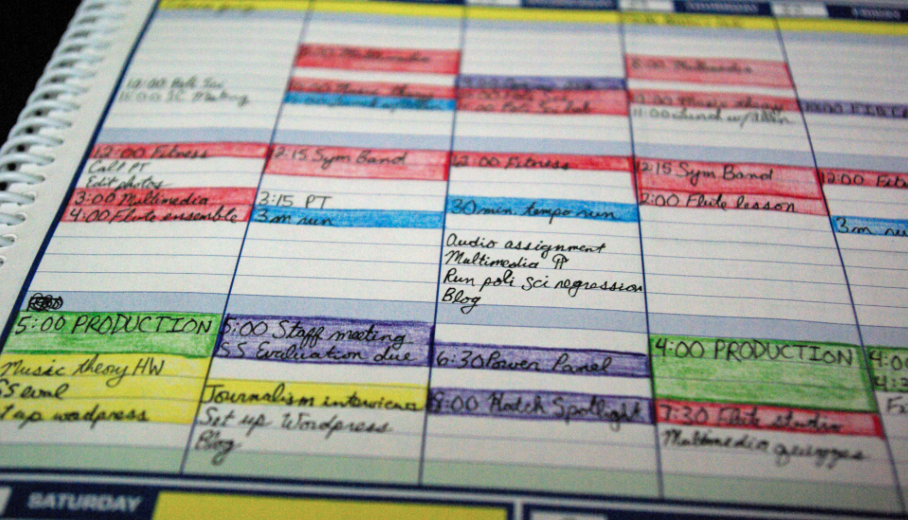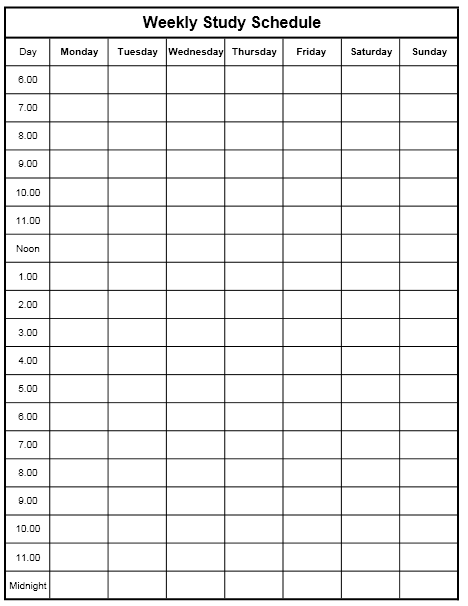Study schedules are often recommended to HSC PDHPE students, but few are taught how to create a study schedule. It is not good enough to create a study schedule that just has you studying 24/7 with no sleep, no fun, no exercise and no family or friends. A study schedule needs to be created well, so here is how to create a study schedule for the HSC.
Create your study schedule in chunks
It is important in creating a study schedule that you decide the best working chunks to break your schedule into. Many schools have timetables that change over a fortnight, which may mean a fortnightly schedule works well for you. But you may not know your work shifts more than a week in advance.
There are many reasons your study schedule may be different from your friends. Your schedule has to suit your basic life flow and importantly will NEED to be UPDATED regularly!
Create a long, medium and short term schedule
It is important that you always know what is coming up when creating a study schedule. A year and term planner will come in very handy as you plan your study. You will need to put work, family, fun, exercise, study and homework/assignments into your schedule.
A year planner will work well as a long term schedule and should have all of your assessment tasks on it, with their due dates, including your HSC exam dates. This will help you with when to plan and prioritise work on assessment tasks, and when to prioritise study.
A term planner breaks the year planner into manageable chunks to work with. Plan out the term, when you have major assessments, or major life events (grand finals, parents 50th etc) to help you to know how much time you have and what to prioritise at those times.
From here, you are ready to begin to create you more immediate, short term study schedule (usually 1-2 weeks in length). If you update this short term study schedule regularly using your term and year planners, you will keep on track and things won’t seek up on you.
Life FIRST then study
As you fill in your study schedules it is important that you put your life in before you try to fit in your study. This is important! You need to have a life during your HSC. Isabella Khoudair (1st place in HSC PDHPE in 2014) studied well but prioritised her life events over her study. (See her study tips here)
The following should be placed in your study schedule BEFORE your study:
- Work shifts
- Exercise/sport
- Social activities (family & friends)
That these are placed before your study, does not mean that they will not take a lower priority to study throughout your HSC year, just that they should be put into your schedule first, so that you study schedule is realistic and achievable.
Study FIRST then others
This is something I picked up from Elevate Education. The first thing you should do in your school work time is your study, NOT your homework due tomorrow, or your assessment task due in two (2) days. The reason for this is that once you have completed your study, you will still complete your homework and assessment tasks. However, if you do the homework and assessment tasks first, you will probably NOT still do an hour of study. Doing the study first forces you to do more work, and helps you to achieve better results.
Short and regular study
Your study schedule should have regular study, every day if possible. But these study sessions do not have to be long. Your memory works best with regular exposure to the content, even if it is just 15 minutes, the regularity of your study will help you to remember and recall information during exams. Study that goes for hours on end, becomes less useful. Your brain will get tired and you will be doing less effective study.
So, make sure the study is short, fit in regular breaks if you can. Even a 5-minute break every hour will help you to focus and study effectively.
How much study?
Really the answer to this question is: “how much can you fit in?” You should not be looking to set time limits or minimums to do every day. The truth is life requires things to vary. I would recommend that you do a minimum of 5 hours a week of study (NOT including homework and assessment tasks), but if you can’t do this much, do what you can. If you can fit in 20 hours, then great study away. Just ensure it is effective study and that it is regular and you will improve.
If you do struggle to fit in more than 5 hours, I might recommend that you look at your life schedule to see if there is anything you could remove from it to create more study time. And if you are doing 20+ hours, I would recommend you look at balancing out your life. Health is very important, you need time for your social, mental, physical, emotional and spiritual health to be grown. Good health helps your brain to function well!
How to create a study schedule:
- chunk your schedule
- use long, medium and short term schedules,
- put your life into the study schedule before your study,
- do your study time before you complete other school work,
- keep your study short and regular,
- aim for between 5 and 20 hrs a week (but don’t stress about how much you do)
They’re my tips for how to create a study schedule for HSC PDHPE.







